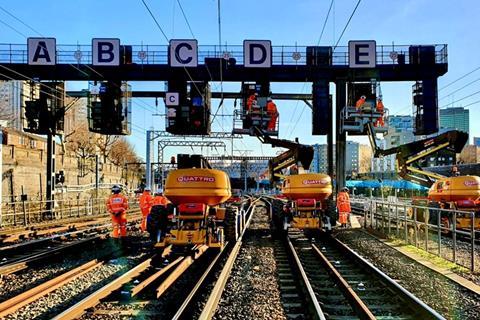
UK: The Swift, Pragmatic & Efficient Enhancement Delivery project to identify ways of reducing infrastructure investment costs and speeding up delivery ‘is a call to arms to cut unnecessary red tape, be bold and purposeful, and empower the railway to be radical in its thinking’, Rail Minister Chris Heaton-Harris told the Railway Industry Association’s Project SPEED conference on February 26.
He said rail would play a crucial part in rebuilding the economy following the pandemic, commenting that ‘businesses cannot compete and prosper if it is difficult for people and goods to move around the country. They need a resilient, reliable, clean railway.
‘By maximising the benefits of every pound that we’re channelling into rail, we will make the case for continued investment’, he added. ‘Our intention is to create a more resilient, resourceful and robust railway, equipped for the challenges ahead and delivering better for its passengers, as we build back better from Covid-19.’

Projects ‘from HS2 to the trans-Pennine route upgrade to East West Rail and the wider Beeching reversal programme’ were ‘bringing new hope and economic activity to regions of the country that have not seen this sort of route investment for ages’.
However, he warned against complacency, saying every proposal must come with a strong business case and offer excellent value, with trust and confidence to be earned by on-time and on-budget delivery.
‘The success of the current rail programme will strongly influence any choices that are made about future investment, future investment that we simply cannot take for granted’, he said.
Project SPEED was helping he said, with 10 key themes for reducing costs and timescales identified through peer reviews and challenge panels.
Reflecting on a succession of projects which have ‘given this industry a bit of an interesting reputation for delays and spiralling costs’, he said Project SPEED was ‘showing what is possible when we work together’.
Amongst the cost-reducing themes is a focus on efficiency, ‘such as simplifying the review process to secure government funding, cutting the time to agree timetables with operators during construction, and shortening the time it takes to get planning consent for rail projects’. Challenging existing standards and assumed ways of working would ensure value for money, for example by looking at how to incorporate innovative and more efficient construction methods.
Heaton-Harris noted that improving how the industry works together ‘is fundamental to the programme’, with a ‘one team culture’ to govern relationships between Network Rail, the Department for Transport, supply chain and stakeholders on any given scheme.
‘The goal is to create a collaborative and accountable team focused on results and empowered to change the culture within the rail industry whilst making efficient use of lots of taxpayers’ money’, he said.



